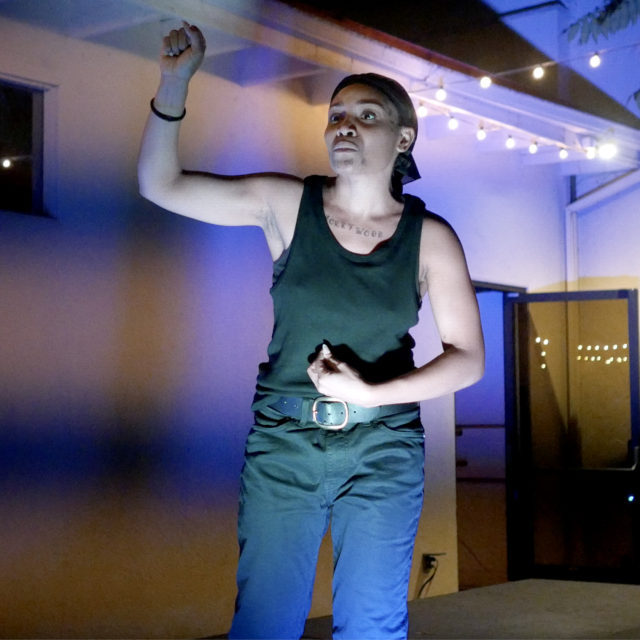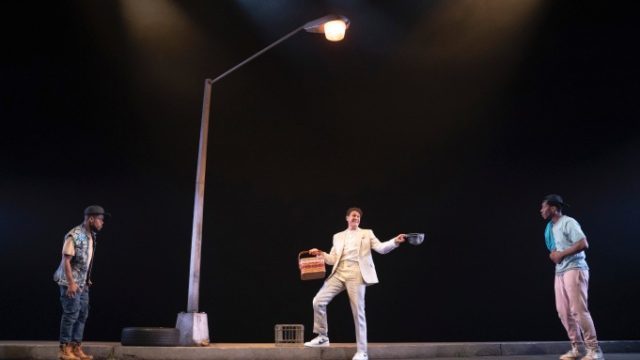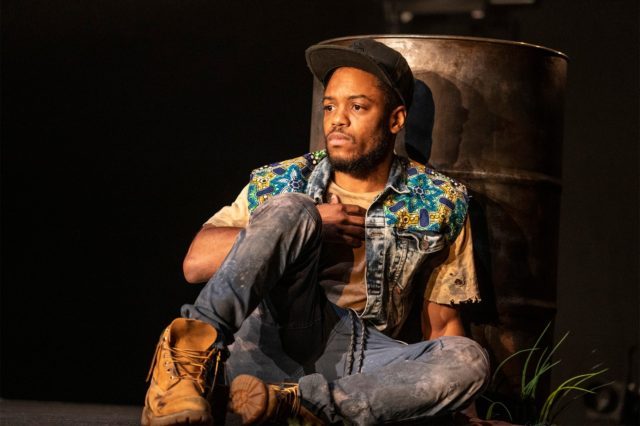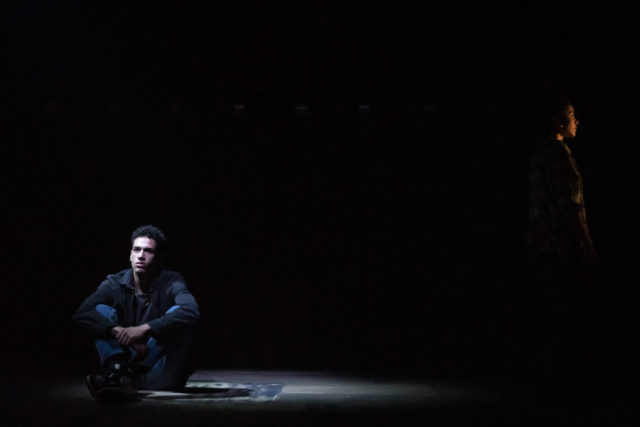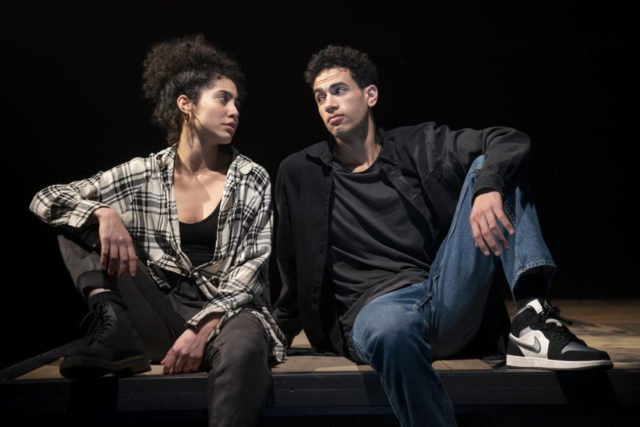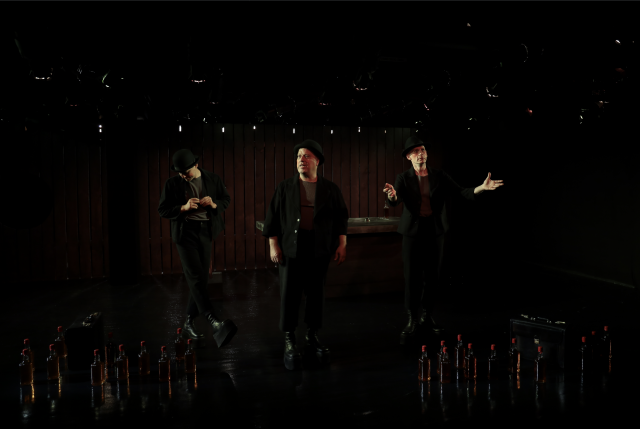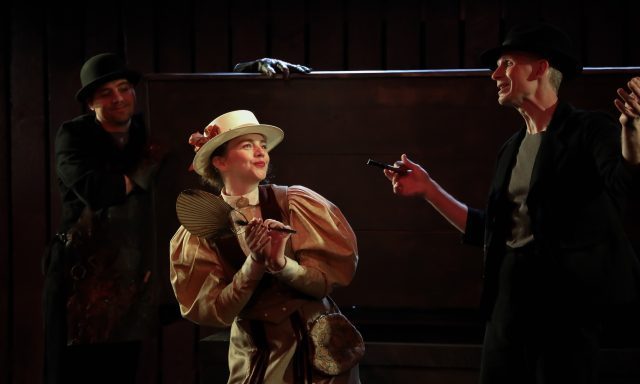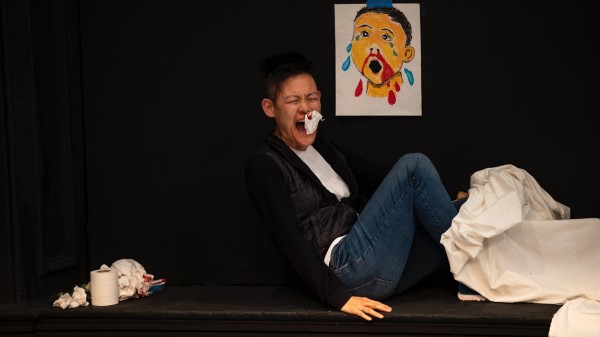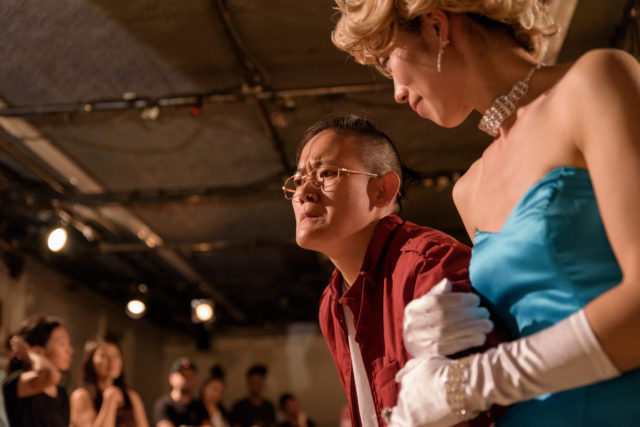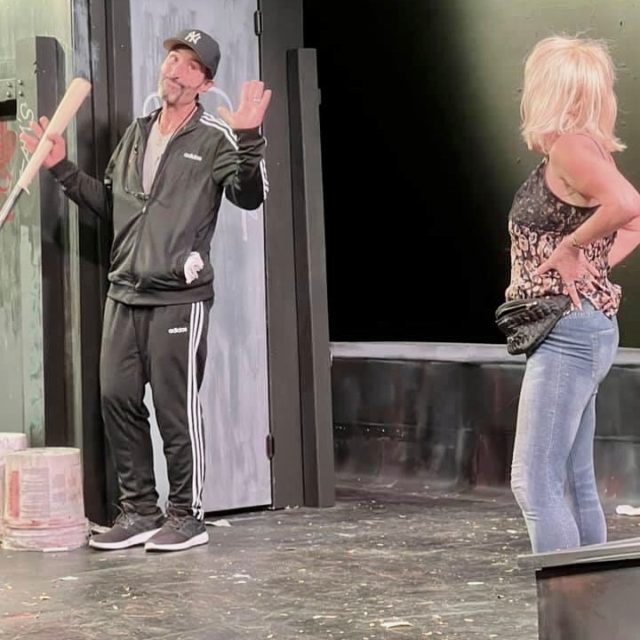
Anthony Barile with Ilene Kristen in Tony DiMurro’s 1-2-3 Manhunt, opening October 10 at Theater for the New City
1-2-3 MANHUNT
Theater for the New City
155 First Ave. between Ninth & Tenth Sts.
Thursday – Sunday through October 24, $15-$18
theaterforthenewcity.net
www.123manhunt.com
“I really thought I had a place in telling stories in film or theater,” actor, restaurateur, Realtor, and kung fu instructor Anthony Barile says to me over Zoom. “People like me are needed. I feel I have a story to tell; I can portray a person like me who has a story to tell.”
I’ve known Barile since high school on Long Island, where he lettered in football and basketball; I never expected that all these years later, I’d be interviewing him about his performance in a play, Tony DiMurro’s 1-2-3 Manhunt, which opens October 10 at Theater for the New City. The show is set on a Lower East Side tenement roof and deals with Alex (Santo Fazio), an old school Italian American man returning to the neighborhood, and Alec (Chris Paul Morales), a Chinese American teenager dreaming of a career as a professional baseball player. Barile portrays Alex’s best friend, Frankie, which came relatively easy; in real life he’s best friends with Fazio, who he met in 1985. They last appeared onstage together in a 1994 revival of Michael Gazzo’s Hatful of Rain at the Actors Studio, helmed by original director Frank Corsaro, that attracted such luminaries as Norman Mailer and Shelley Winters.
Barile’s path to becoming an actor was a circuitous one.
“It was completely by accident,” the Brooklyn-born Barile explains. “I was going through a lot of changes at this particular point of my life. It was around 1990. I was in a long-term relationship that had ended, and, with that kind of life jolt, I decided to take the time for myself to explore things.”
He quit college the day Led Zeppelin drummer John Bonham died, drove a bread truck, then moved to Manhattan in the mid-’80s and started snapping a lot of pictures around the city. He took a photography class at SVA, a martial arts class — “I thought, I kinda like to fight, so this would be good” — and studied film production at NYU, a connection that led him to acting.
“A lot of friends I met, through my roommate at the time, were actors,” he remembers. “I was invited to a barbecue on the Fourth of July, and one of his friends was studying with Sandra Seacat. She was at this barbecue and got to speaking with me and invited me to her acting class. It was unrelated to acting — she wasn’t that kind of person. She’s a wonderful human being, a phenomenal acting coach; she was just interested by me. I don’t know, she embraced me. She was thinking, ‘This guy’s been through some stuff, he’s leaving his twenties — he should come to my class.’
“Because that’s what her classes were about, finding out who you are, in a healing way. I’m like, I don’t think so; it’s not really my thing. But then I’m thinking that if I want to work with actors in film, maybe it’s a good idea I understand how they think, how they operate, what the process is. So I go.
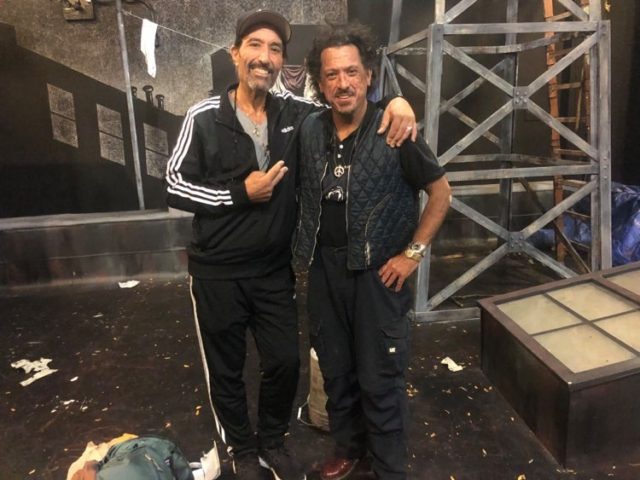
Former Three of Cups co-owners Anthony Barile and Santo Fazio reunite onstage for the first time in twenty-five years
“I still have my notes, my journal from that day — it was mandatory that you take notes. I read it every once in a while, and I was writing, ‘These people are nuts. They’re super self-indulgent and just out of their minds. This is an insane way to spend a day.’ But I continued in her class because I was fascinated. I’d go to her special workshops, where there would be people who would come from all over the country, some big names. I was never really starstruck; being a New Yorker and living in New York City, especially in the ’80s and then the ’90s, you see famous people all the time. But now I’m watching their process. It was amazing. And now she wants me involved, she wants me acting; she snuck it in on me.”
Barile, wearing a Mets hat and Pretenders T-shirt, shakes his head and laughs as he recalls what happened next.
“We’re doing all kinds of Chekhov pieces. Now, I’m going to be honest with you; I’d never read Chekhov. I don’t know who Chekhov is. This is not my world. Okay, I’ll read it. So I read it and I’m like, ‘Well, this is pretty crazy stuff. Do I understand this even? And then she gives me a scene partner, a name actor, and another friend of mine. We’re doing a scene from Kafka’s The Trial. Again, this is so foreign to me.
“The name actor is getting ready to audition for a major motion picture, so he’s there to get his chops together. So I go up to Sandra and I say, ‘Sandra, you think I should tell him that I’ve never acted before?’”
He laughs again. “And she’s like, ‘Oh, no. Oh, no no no no no. What’s acting? You’ll only make him nervous. There’s no reason for that. Just go, go live, go do the work I’m telling you to do, and go live this scene.’ So I did, and it was kind of phenomenal. So that was the beginning of the bug.”
Barile learned a lot more than acting from the workshops.
“As a human being, it was like an exorcism of my soul. We did dreamwork and numerology and method sensory work, we studied Indian philosophers and poets, Jungian psychology. It made me look at my life and go, ‘What has been going on?’”
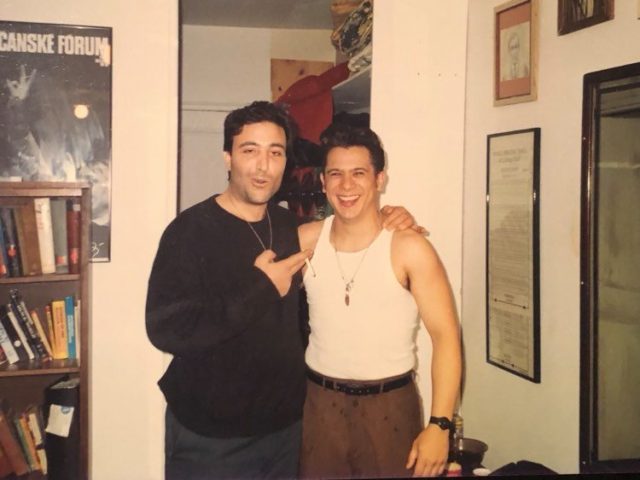
Anthony Barile and Santo Fazio share a moment while appearing together in Hatful of Rain at the Actors Studio
His next teacher literally threw the book at him.
“I went on to study with Susan Batson — that was another insane experience where I wasn’t fully prepared for what I was walking into at all. The first time she saw me, she said to the other students, ‘Who’s the Anthony Quinn–looking motherfucker?’ It was an audition class; I didn’t know that. She would have us dance in a circle, speak our thoughts, and then she would write a monologue every day and have you perform it in front of a director and casting agent. Your job was to get the job.
“But she was so brutally tough. She threw things at me at times. She would sit in her apartment with her back against a bookcase. This one time, I remember, my character was supposed to cry in this emotional moment. And my crying was so phony that she just reached back, grabbed a book off the shelf, and flung it at me. I didn’t see it coming, so I got hit in the head by it. She’s like, ‘What the fuck is that? Don’t ever fucking do that in my fucking class again. Get the fuck out of here. If you really gotta cry, pull a hair out of your nose, but don’t do that shit.’
“I didn’t go back for weeks after that, but then I went back, and she tells me, ‘You’re either very brave or very stupid.” Barile also studied with such other prestigious teachers as Marcia Haufrecht and Sheila Gray.
In December 1992, Barile, Fazio, and a third partner had opened the Three of Cups, a Southern Italian restaurant on First Ave. Three of Cups cook Anthony Alessandro was an Actors Studio member, and when one of the supporting actors in Hatful of Rain wasn’t working out, Alessandro asked Barile to take over the role of Chuch, a junkie who was played by Harry Guardino in the 1956 original Broadway production.
“I was scared shitless. What an amazing experience. But I was terrified,” Barile readily admits. “I had gone knee deep into studying; I was entrenched. But all of that work went out the window because I was so fucking scared. Fortunately, the actors in this play were so good that all I really had to do was listen — listen backstage, listen onstage, and I was in it. I just opened my heart and listened, learning to just really be free.”
His next show changed his life. His friend Mark Nassar, a Three of Cups regular, had originated the role of Tony in the hit immersive play Tony n’ Tina’s Wedding. Nassar suggested that Barile join the cast in 1995, portraying the groom’s best friend. At the end of his one-year run, Barile started dating Justine Rossi, who played Tina. The two later married; they now live in Bayside and have two kids in college.
“What a great gift it’s been,” Barile says of Tony n’ Tina. Before the pandemic, he was asked to come back as the priest, Father Mark, and has performed the role in New York as well as in Oklahoma, North Dakota, South Dakota, Ohio, Pennsylvania, Florida, and New Orleans. He’ll be playing Tony’s father in Chicago in November, and recently his daughter appeared in the show, which includes a heavy amount of improv.
“Owning Three of Cups was very helpful in that. What they call it in Tony n’ Tina’s Wedding is table work, because it’s a wedding, you’re dealing with dinner guests. So my interaction with my customer base at Three of Cups got me ready for that. By nature, I’m a ballbreaker. I like comedy; I’m not afraid to break horns or just tell you what I think. So all of those things helped each other. And that training makes me a stronger actor for sure.” He would later appear in plays by David Mamet and John Patrick Shanley in black box theaters, including inhabiting a half dozen characters in Mamet’s Edmond. Three of Cups, where Justine had also worked before they were married and which hosted live music and comedy in its downstairs space, closed in April 2018.
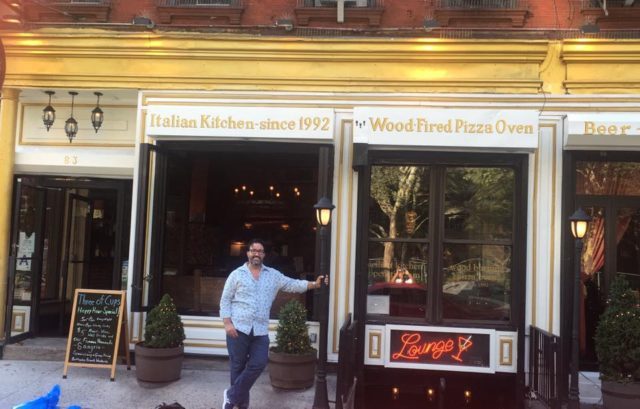
Anthony Barile stands outside his beloved Lower East Side restaurant, Three of Cups
In 1998, Barile played the brutally violent Sally Hipps in DiMurro’s fabulously titled Moe Green Gets It in the Eye at La Tea Theater at the Clemente Soto Velez Arts Center on the Lower East Side.
“I connect to Tony’s writing,” Barile says. “He’s very New York, writing about the Italian American experience. I’m very familiar with that because a lot of the characters he writes about I know very well, whether they be family members, acquaintances, friends, people I’ve worked with. I like his language, and he’s a super guy as well.”
In 1-2-3 Manhunt, which is directed by William Roudebush with set design by Julie DiMurro, Tony’s wife, Barile plays another tough guy, Frankie. They were supposed to begin rehearsals in March 2020, but the pandemic canceled that. Since then, DiMurro has made small changes to incorporate the coronavirus crisis and other current events. They chose not to rehearse or do any readings over Zoom, getting together instead for the first time about a month ago.
“My favorite thing about my character is his enjoyment of a good laugh,” Barile explains. “He loves a good laugh, and he’s a ballbreaker. Listen, the writer knows me. Tony put things in the piece that are straight references right out of Three of Cups, because he used to visit me there all the time.”
Barile is also thrilled to be working with Fazio again.
“It’s like, wow. He’s my best friend in the show,” he tells me. “I’ve known Santo since 1985. It’s fun telling him stories onstage in character, because he’s my best audience. He can recognize when I’m in truth.”
A huge Mets fan — he was at Shea Stadium and Citi Field for the deciding World Series games in 1986, 2000, and 2015 — he is not thrilled with where the club is after a disastrous year.
“It will be a blow-up off-season, from top to bottom, starting with the front office,” he says. “They suck. It’s a curse. I was miserable. I can’t even believe my investment emotionally.”
I ask him what it’s like wearing a Yankees hat in the show.
“Frankie is definitely a baseball fan, and I figured that him being from Staten Island, he’s a Yankees fan. It also was a way for me to know I was playing someone else, not myself, because I’m most comfortable and successful in characters that aren’t too far removed from who I am.
In my approach to a character I like to have at least one part of my costume/wardrobe anchor me to him. In this case it’s the Yankees hat, for sure. As the great Lee Marvin once said, ‘Show up on time, know your lines, and let the clothes do the acting.’”
Barile and his wife also starred together as a couple preparing to go out for the first time since the pandemic took hold in Kevin Alexander Leonidas’s short film You Can’t Fix Stupid, and Barile, aka Mummy, appeared in David Shapiro’s seven-part documentary series Untitled Pizza Movie, about famed pie man Andrew Bellucci.
“I enjoy a good story,” Barile says. “You just want to be natural about it. Just tell the story.”
